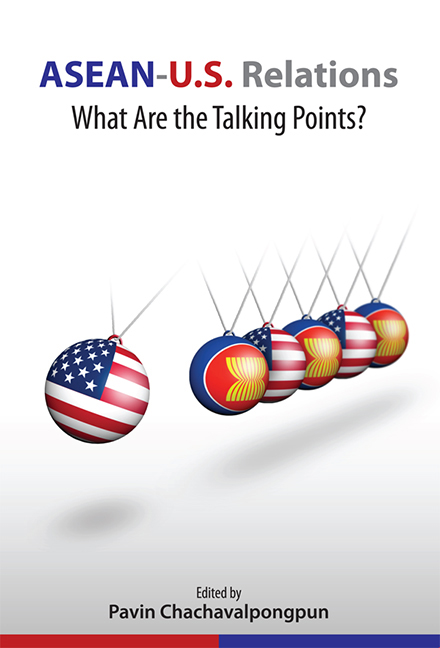Book contents
- Frontmatter
- Contents
- List of Tables and Figures
- Preface
- Contributors
- List of Abbreviations
- OVERVIEW
- QUINTESSENTIAL ISSUES
- 6 A New Era in the Long-Standing U.S.-ASEAN Relationship
- 7 Maritime Security in Southeast Asia and the United States
- 8 ASEAN's View on the U.S. Military Role in the Region
- 9 United States–China Relations
- 10 Shift in U.S. Policy towards Myanmar
- 11 United States Assistance to ASEAN through the ADVANCE Programme
- 12 Conclusion
- Index
9 - United States–China Relations
from QUINTESSENTIAL ISSUES
Published online by Cambridge University Press: 21 October 2015
- Frontmatter
- Contents
- List of Tables and Figures
- Preface
- Contributors
- List of Abbreviations
- OVERVIEW
- QUINTESSENTIAL ISSUES
- 6 A New Era in the Long-Standing U.S.-ASEAN Relationship
- 7 Maritime Security in Southeast Asia and the United States
- 8 ASEAN's View on the U.S. Military Role in the Region
- 9 United States–China Relations
- 10 Shift in U.S. Policy towards Myanmar
- 11 United States Assistance to ASEAN through the ADVANCE Programme
- 12 Conclusion
- Index
Summary
The relationship between the United States and China is the most important bilateral relationship in the twenty-first century. The status of the bilateral relationship is significant not only for the two most powerful nations, but also for the rest of the world. This relationship has three important characteristics. In political terms, the United States and China are strategic partners. They are two of the most important players in both bilateral and multilateral issues in the world. In economic terms, they are both partners and competitors. In terms of military relations, the two countries are both competitors and partners.
There are some important issues facing the United States and China. Bilaterally, the United States and China will have to address their different concerns. For China, certain issues are concerned with its core interests. These include Taiwan, Tibet, Xinjiang, and the South China Sea. For the United States, China's currency exchange issue and human rights are major concerns. Multilaterally, the United States needs China more than China needs the United States. The United States needs China's cooperation on nuclear issues in North Korea and Iran, as well as a host of other issues, such as energy security and climate change.
The United States and China have developed some mechanisms to deal with issues of their mutual concerns. These include summit meetings and regular exchanges between top leaders from the two countries, and annual strategic and economic dialogue sessions. These mechanisms have facilitated political communications between the two countries, but have yet to produce more tangible results.
MAIN CHARACTERISTICS OF U.S.-CHINA RELATIONS
Strategic Partnership
Although it is not explicitly spelled out in the joint statement issued by the United States and China in November 2009, the two major powers regard each other as strategic partners. U.S. President Barack Obama has taken China much more seriously than his predecessors. He has indicated on a number of occasions that China is becoming an important global power and that the United States treats China not just as a partner, but as a strategic partner, as reflected in his interview with Reuters on the eve of his first Asia trip on 9 November 2009.
- Type
- Chapter
- Information
- ASEAN-U.S. RelationsWhat Are the Talking Points?, pp. 83 - 98Publisher: ISEAS–Yusof Ishak InstitutePrint publication year: 2011

